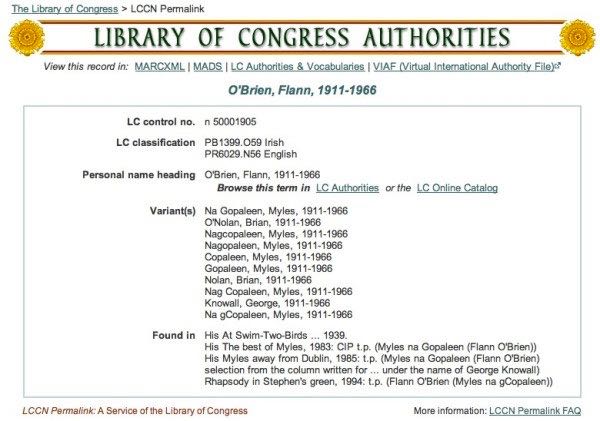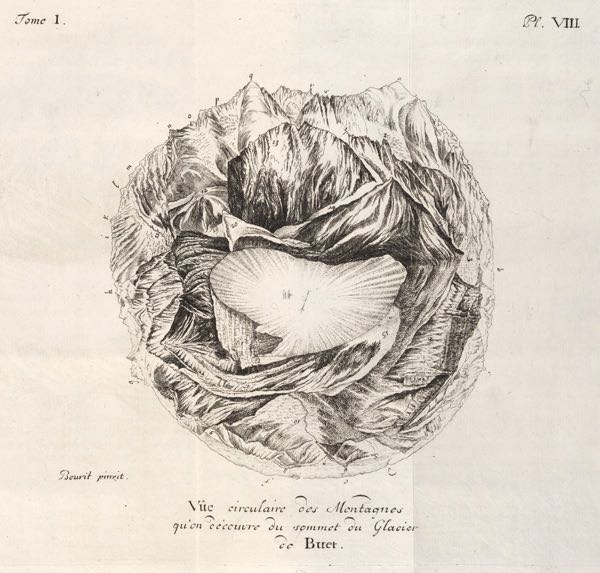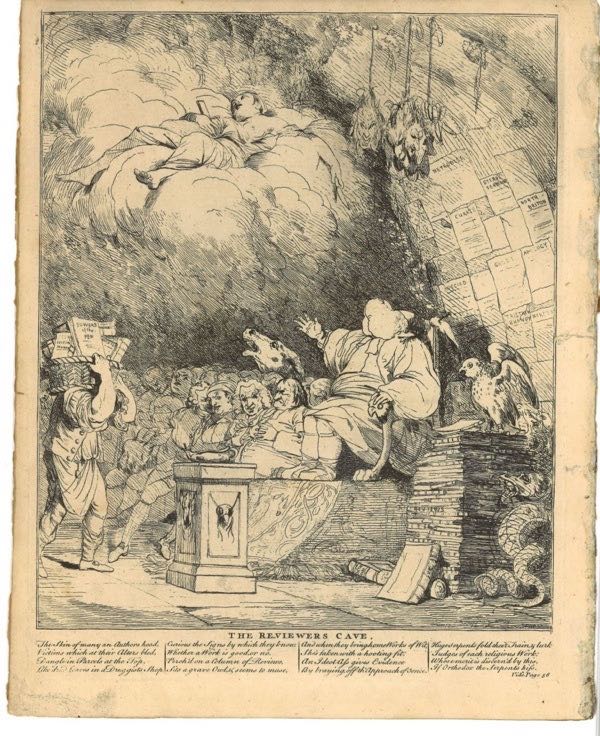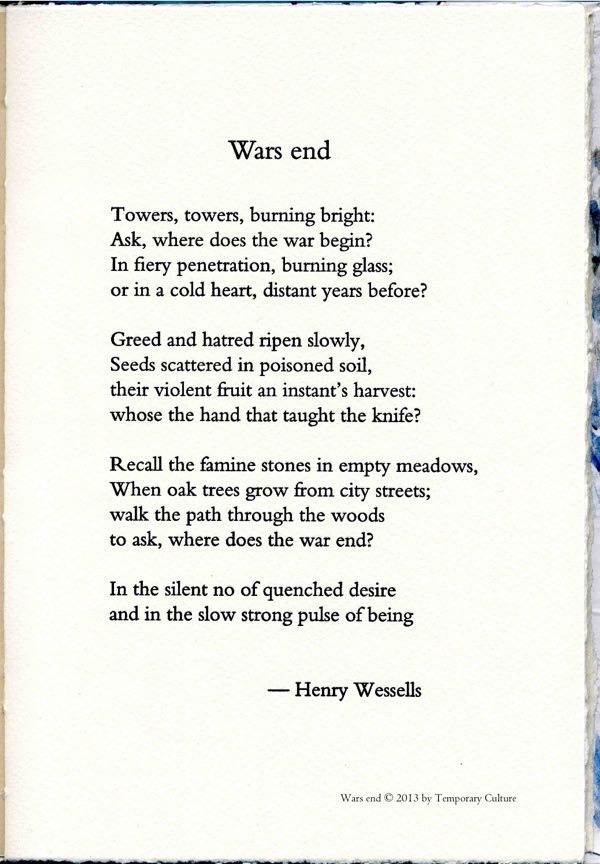
July - August 2013

25 August 2013
current reading
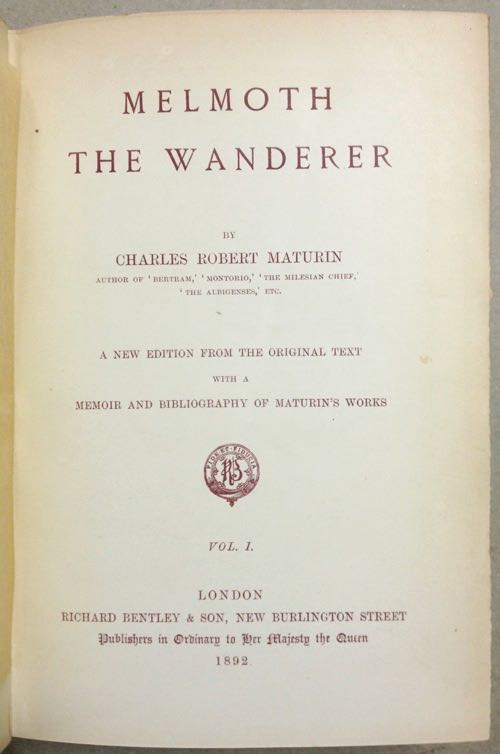
— Charles Robert Maturin. Melmoth the Wanderer [1820]. A new edition from the original text with a Memoir and Bibliography of Maturin’s Works. In three volumes. Richard Bentley & Son, 1892.
— Vermont. A Guide to the Green Mountain State. Written by the workers of the Federal Writers Project of the Works Project Administration of the State of Vermont. [At head of title :] American Guide Series. Illustrated with 64 pages of photographs, map endpapers, maps, folding map. Houghton Mifflin Company, 1937. A portable time travel device.
— — — —
Corvo centenary catalogue

— Timothy d’Arch Smith. Frederick William Rolfe. Baron Corvo (1860-1913). His Family and His Circle.
A Centenary Catalogue . With an Essay on the Baron Corvo Title by Robert Scoble. [London : Timothy d’Arch Smith, Bookseller], 2013.
A substantial catalogue of 63 items including numerous autograph letters
showing Rolfe in a variety of circumstances from dire need to good
spirits ; the Bradley Martin copy of Rolfe’s first book, Tarcissus (1880 or 1881), and an array of scarce, ephemeral, and interesting material.
The cover image shows a Regency-era piano made by Rolfe’s great-grandfather.
Scholarship on Corvo continues to elucidate new biographical information,
and this catalogue
includes
an
original
essay, “ The Title ‘Baron Corvo ’ ”, on the roots and eclipse of Rolfe’s sometime pseudonym, by Robert Scoble, who
has published a series of fifteen monographs on Corvo during the past decade.
A complete set of the monographs is described here. Another item comprises
a group of three letters to
A.J.A.
Symons from a Beardsley collector who refused the Corvo biographer’s request for unfettered access to bibliographical information ; d’Arch Smith puts it succinctly, “ A hostile correspondence. ” He cites a phrase suggesting the collector’s misgivings : “ I do not know whether you have sufficient qualifications to say what is or what
is not a genuine drawing by Beardsley. ” The catalogue does hint at the curious degree of acrimony that has sometimes
prevailed among acolytes of Corvo. [Your correspondent is immune to the
Corvo bacillus but values the‘ Reviews of Unwritten Books ’.]
— — — —
Library of Congress Name Authority : Flann O’Brien
http://lccn.loc.gov/n50001905
“ He took many pseudonyms, not all of which have yet been properly accounted for. ” — Timothy O’Keeffe
— — — —
A new way of looking at things ; or, At the Dawn of the Gothic
Plate by Bourit, in: H.-B. de Saussure. Voyages dans les Alpes, 1779.
Yale copy : http://brbl-zoom.library.yale.edu/viewer/1464735
— — — —
recent reading
‘ To the pure all things are pure ; to the Puritan all things are impure ’
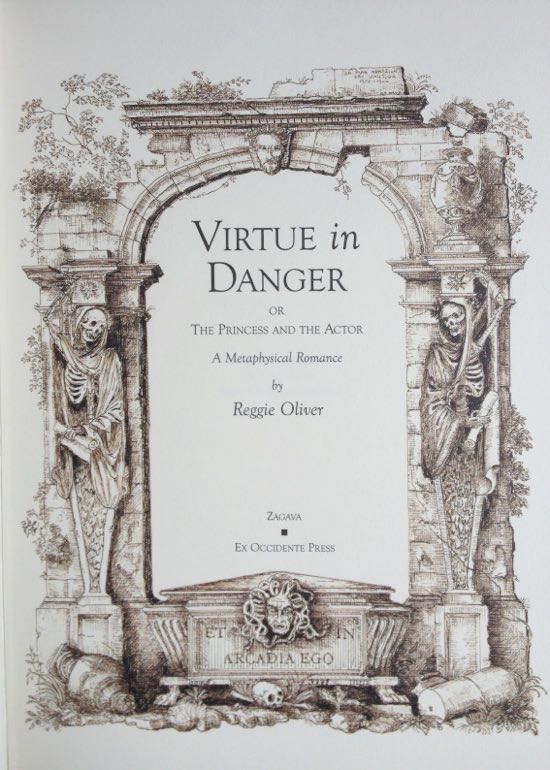
— Reggie Oliver. Virtue in Danger or The Princess and the Actor. A Metaphysical
Romance. [Düsseldorf :] Zagava [and : Bucharest :] Ex Occidente Press, [2013].
A good novel of the workings of a smarmy cult,
the perils of didactic theater, and a beautiful evocation of the recent,
unattainable
past. Set in the summer of 1963, Virtue in Danger has a curious Ruritanian flavor * : as sometimes happens, a personable young man, Ivor Smith, wanders into events
far bigger than he knows. Breitman, leader of the Moral Regeneration Movement,
is about to die in the vast Swiss hotel that is the international organization’s headquarters.
Smith, a professional actor hired to play an anchoring rôle in a piece of
MRM theater, walks into the hornet’s nest of the conflicting ambitions of Breitman’s
would-be successors and benefactors. Oliver has a gift for sentences that
are larger than they seem. “ To Smith, the play seemed like MRM itself in a microcosm : absurd and yet curiously seductive. ” Though Breitman is an American, his cult is cosmopolitan. The Cold War
European setting makes for some odd characters rubbing together. The exiled king of Slavonia is a choice minor character. Ivor Smith’s refusal to embrace the temptations of power makes Virtue in Danger an engaging tale of hypocrisy exposed.
The book is bound in rumpled mulberry silky cloth covers and is attractive.
The book is co-published and distributed by a German firm specializing
in contemporary
supernatural
literature in English, Antiquariat Bücherwelten. The title page also
bears the Romanian imprint of Ex Occidente ; your correspondent hopes
that the distribution problems that persistently characterized dealings with
Ex Occidente have been resolved.
* It took me some time to put my finger on it, but I was reminded of the political intrigues of The House of the Four Winds (1935) by John Buchan : except that Oliver’s characters dance with their own energy by comparison to Buchan’s marionettes. Smith and his young acquaintance Alice, princess of Slavonia, have more going on Buchan could ever have envisioned ; and the reader is spared Buchan’s heavy-handed narrative interjections.
— — — —
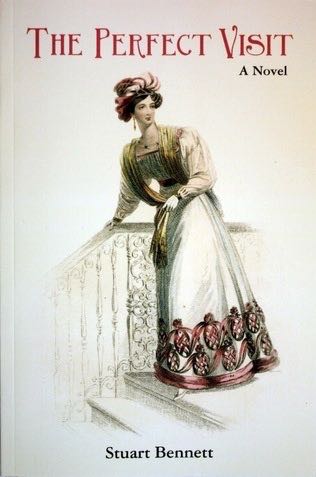
— Stuart Bennett. The Perfect Visit. A Novel. Longbourne Press, [2011]
A sly, well-written, and deftly choreographed bibliographical romance
of two time-travelling literary scholars sent
into the past to harvest Shakespeare quartos and Austen manuscripts so as to
fund further time travel research. Ned Marston
and Vanessa Horwood possess the various skills
necessary to their task — a good memory, accomplishment on the pianoforte,
bibliographical smarts and the eye for a fine book, and mastery of
self
defence, whether with short sword and dagger or unarmed — but it is a commonplace of time travel that something must go wrong. The
Perfect Visit is no exception. When, in 1817, an inattentive clerk should
hastily and falsely deem a bank draft a forgery, Miss Horwood misses
her return trip and is confined to Winchester Gaol to stand trial on
a capital crime. In 1607, having met Shakespeare through printed books
and in person, Ned Marston
kills a brigand set upon him, at the very place where he is to return
to the
future, and so lands in 1833. How Vanessa escapes hanging, and under
what circumstances Ned and Vanessa meet again, is the successful braiding
of two complex narrative strands. One of the pleasures of Bennett’s
narrative is when Vanessa’s twenty-first century instincts and training
collide with the norms of Regency society, and stereotypes from Austen’s novels display their true colors. The Perfect
Visit is a book full of incident, rich in literary allusion and in
books it would be a joy to hold in one’s hands.
— — — —
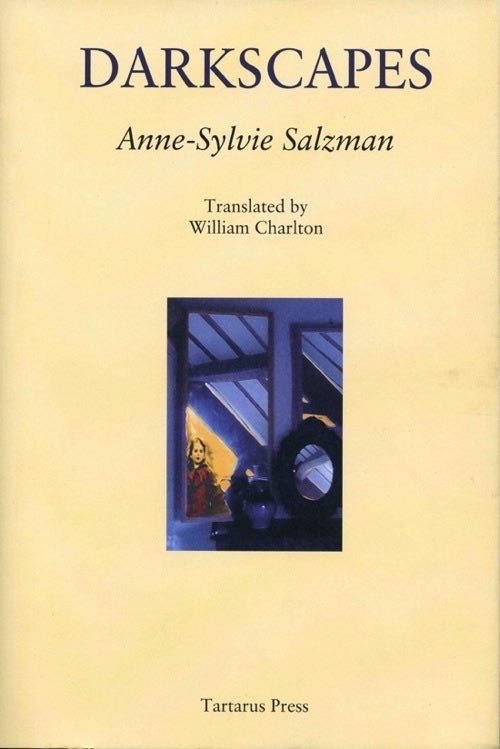
— Anne-Sylvie Salzman. Darkscapes. Translated by William Charlton. Tartarus Press, 2013]. Short stories, uncanny, startling. “ Child of Evil Stars ”, with its Austro-Hungarian carnival sideshow setting, briefly reminded me of the Eszterhazy stories of Avram Davidson, and yet Salzman is fundamentally darker ; a conceit treated in humorous fashion by Fredric Brown becomes an unspeakable piece of evidence in this tale of obsession. “ Feral ” has a horrifying, unrelenting logic to it. These are very unsettling, capably translated stories.
— — — —
adventures in re-reading
Roland Barthes on re-reading : “ elle n’est plus consommation, mais jeu ” / “ rereading is no longer consumption but play ”
— Richard Hoyt. 30 for a Harry. A John Denson Mystery. M. Evans, [1981]. Re-read.
— H.H. Munro. The Penguin Complete Saki. [St. Ives, Richard Clay for :] Penguin Books, n.d. Dipping into the stories, with pleasure. Had not read Saki for many years, and very much enjoyed the intrusion of the irrational into an ordinary Edwardian household in “ The Schartz-Metterklume Method ”, for example ; and this, from “ A Defensive Diamond ” :
“ I believe I take precedence, ” [Treddleford] said coldly; “ you are merely the club Bore; I am the club Liar. ”
— John Crowley. Little, Big [or, The Fairies’ Parliament] (1981). I have written earlier about the delights of re-reading this novel. Long ago I stopped counting how many times I have re-read this book ; and how many copies I have given to friends and strangers.
In later years he would wonder, sometimes idly, sometimes in anguish, whether having once entered Little, Big he had ever again truly left . . .
— — — —
things as they are
Your correspondent read a recent mystery novel, [author name and title will not be disclosed], published by major commercial house, initially a competent first person narration but then with third person intervals to tell what the first person narrator cannot know or learn : resolving epistemological tangles that way may be oh so convenient, but, like withholding information, undermines a certain unity of effect. It is not a question of third person narration but of the writer’s decisions informing that how that narration unfolds : an epistemological problem. If publishers expect readers to buy sloppy thinking, over time bad writing drives out good — in crime and mystery fiction as in other modes. This phenomenon also goes a long way to explain why truly accomplished books (crime, fantastical, etc.) are nimble, memorable, and outstanding. And then there was a thick paperbound volume of pages, a work of fiction, presumably, in language so filled with jargon as to be hermetic and utterly impenetrable. To clear my head I re-read my copy of a pellucid favorite : [Timothy] Hyde Harris. Kyd for Hire (1977).
— — — —
‘ An Ideot Ass gives Evidence | By braying off th’Approach of Sence ’ : The Reviewers Cave
Courtesy of Stephen Ferguson : http://blogs.princeton.edu/notabilia/2013/07/30/the-reviewers-cave
— — — —
The visual record
The Endless Bookshelf long ago abandoned any systematic consideration of the notion of bookshelves as mirrors of character, and the number of websites devoted to bookshelves has grown beyond number. One recent effort stands out :
Your correspondent notes a disproportionate number of portraits with dark glasses and bookshelves ; this portrait of the website’s editor, Max Fenton, is not one of them.
— — — —
The next update of the Endless Bookshelf will be in late September. Send news of what you have been reading this summer.
— — — —
1 August 2013
Wars end
— Henry Wessells. Wars end. Poem reprinted from Against the art of war by Ernest Hilbert and Henry Wessells and Judith Clute. Published 15 February 2013 in an edition of 26 copies by Temporary Culture. [Scan of an original letterpress leaf printed by David Wolfe.]
— — — —
28 July 2013
“ I conjure Oberon : avenge thy children. ”
— Greer Gilman. Cry Murder! in a Small Voice. Small Beer Press, [forthcoming, September 2013]. vi, 53 pp. Jacobean crime tale in dazzling prose style. Signed by the author after she performed passages from the book at Readercon.
The tale is swiftly told : a rich peer — evil and depraved, if words still have meaning — took his pleasure in killing little boys ; a drunken poet, grieving, went down these mean alleys to end this wrong, with the help of a boy who knew one of the victims. But this is not all, this is almost nothing : for Gilman’s gesture and language — the dance of paper figures, and an orange offered in winter — are magic. Read carefully, taste the words upon the tongue. Not everything is what it seems.
— — — —
Recent reading
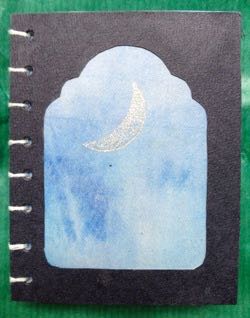
— Jules Laforgue. Litanies for the first quarter of the moon. A version by Mark Valentine. [Valentine & and Valentine, 2013]. Parallel text in French and English, on translucent art vellum sheets, with wash watercolor backgrounds interleaved. Presentation copy from the author and bookbinder.
— Muriel McCarthy. All Graduates & Gentlemen. Marsh’s Library. Dublin : The O’Brien Press, 1980. The life of Archbishop Narcissus Marsh (1638-1713), and his library, rich in early printing and other treasures. “ The novelist and dramatist Charles Robert Maturin (d.1824) also wrote in Marsh’s. William Carleton mentions a visit to Marsh’s in his Autobiography. ”
— Gardner Dozois, editor. The Year’s Best Science Fiction. Thirtieth Annual Collection. St. Martin’s Griffin, [23 July 2013].
— — — —
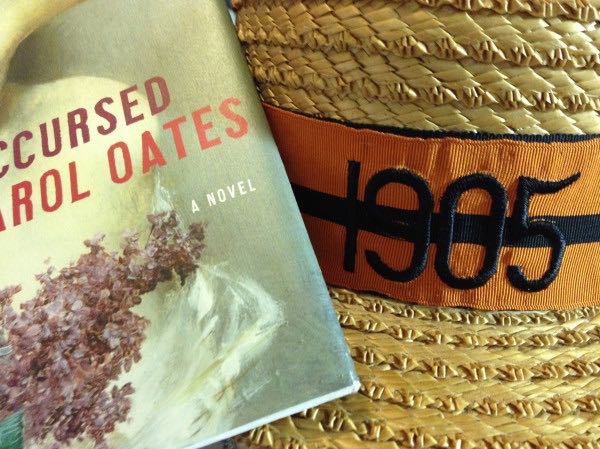
— Joyce Carol Oates. The Accursed. Ecco, [2013]. Princeton, 1905-6 : everyone and everything is there ! Woodrow Wilson, the American establishment, Upton Sinclair (!), Mark Twain, Jack London, Lovecraft, Poe (Pym and the House of Usher), The Yellow Wallpaper, the Fairy Tale, Sherlock Holmes, a scaffolding of elements of Gothic literature (such as Difficulty, the Edifice, Confinement or Incarceration), vampires, lunatic science, secret diaries, imaginary books, and, above all : Race in America. This is a vast and sprawling fantasy of American history, which I read marvelling at the author’s skill in presenting a stacked deck to which the reader responds, Deal ! In another century, the novel might have borne a subtitle : The Accursèd ; or, The Temptation of Woodrow Wilson. Not subtle, but irresistible. The difficulty of writing about the unspeakable is addressed explicitly and in the evasions of the notional narrator (a grandson of Henry Van Dyke . . . though the name is spelled archaically) ; that the Epilogue, a lunatic confessional sermon of a dying man, is unreadable, is a trifle. My experience of the work of Joyce Carol Oates is limited to The Rise of Life on Earth (1991) and some short fiction, but as in the novels of Tana French, no character escapes unharmed ; nor reader, as with Conrad, unmoved.
[Above : montage of The Accursed and a straw boater (Bates of London) with Class of 1905 hatband.]
— — — —
Birth-day Beauties, Kitty Mulrooney’s Cow, and other Pleasures of the Text
At Readercon on 14 July, your correspondent delivered a talk from notes entitled “ Reading the Fantastic ; or, The Fainting Narrator. A Meander and a Conclusion ” that traced lines of connection between aspects of the Gothic narrative and the narrative strategy of a twentieth-century American author. The texts discussed included Matthew Lewis, The Monk (1796), and Lady Morgan, The Wild Irish Girl (1806 ; third edition, 1807), with specific reference to difficulty and narrative delaying tactics ; and the profusion of languid, fainting narrators in the writings of H.P. Lovecraft (specifically “ The Shadow over Innsmouth ”, “ The Shunned House ”, “ The Whisperer in Darkness ”, and “ The Thing on the Doorstep ”). The notes for the talk will be expanded into an essay at a future date (the full title of the talk had not been composed when the convention schedule went to press).
— [Sydney Owenson, later Lady Morgan]. The Wild Irish Girl. A National Tale by Miss Owenson. Third edition, 1807. Reading this Gothic Hibernian novel that subverts and transforms many of the standard elements of the mode, I found several unexpected pleasures, such as this, in volume I (on pages 178-9) :


This vernacular tale is quietly spectacular : that string of asterisks demonstrates intention. Kitty Mulrooney’s Cow must be ranked alongside The Dragon Skin Drum (in Avram Davidson’s story of the same name) as a model of laconic narrative and deliberate artifice. There was one other passage of particular note (also in volume I) :
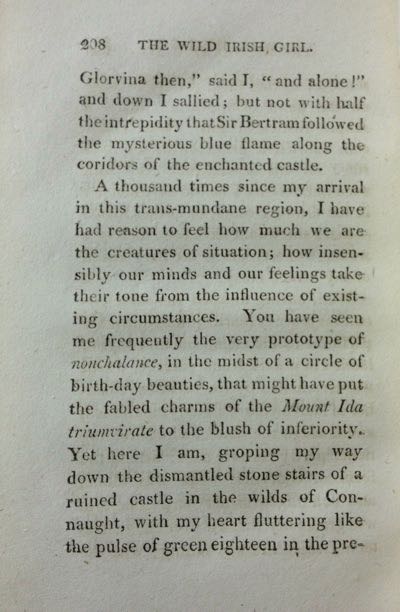
— — — —
This creaking and constantly evolving website of the endless bookshelf : I expect that some entries will be brief, others will take the form of more elaborate essays, and eventually I will become adept at incorporating comments or interactivity. Right now you’ll have to send links to me, dear readers. [HWW]
electronym : wessells
at aol dot com
Copyright © 2007-2013
Henry
Wessells and individual contributors.
Produced by Temporary
Culture, P.O.B. 43072, Upper Montclair, NJ 07043 USA.
